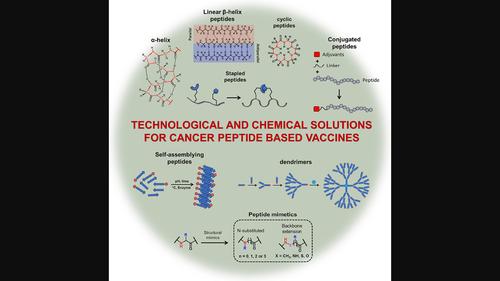当前位置:
X-MOL 学术
›
J. Pept. Sci.
›
论文详情
Our official English website, www.x-mol.net, welcomes your feedback! (Note: you will need to create a separate account there.)
The bright side of chemistry: Exploring synthetic peptide‐based anticancer vaccines
Journal of Peptide Science ( IF 2.1 ) Pub Date : 2024-04-04 , DOI: 10.1002/psc.3596 Antonia D'Aniello 1 , Alessandra Del Bene 1 , Salvatore Mottola 1 , Vincenzo Mazzarella 1 , Roberto Cutolo 1 , Erica Campagna 1 , Salvatore Di Maro 1, 2 , Anna Messere 1, 2
Journal of Peptide Science ( IF 2.1 ) Pub Date : 2024-04-04 , DOI: 10.1002/psc.3596 Antonia D'Aniello 1 , Alessandra Del Bene 1 , Salvatore Mottola 1 , Vincenzo Mazzarella 1 , Roberto Cutolo 1 , Erica Campagna 1 , Salvatore Di Maro 1, 2 , Anna Messere 1, 2
Affiliation

|
The present review focuses on synthetic peptide‐based vaccine strategies in the context of anticancer intervention, paying attention to critical aspects such as peptide epitope selection, adjuvant integration, and nuanced classification of synthetic peptide cancer vaccines. Within this discussion, we delve into the diverse array of synthetic peptide‐based anticancer vaccines, each derived from tumor‐associated antigens (TAAs), including melanoma antigen recognized by T cells 1 (Melan‐A or MART‐1), mucin 1 (MUC1), human epidermal growth factor receptor 2 (HER‐2), tumor protein 53 (p53), human telomerase reverse transcriptase (hTERT), survivin, folate receptor (FR), cancer‐testis antigen 1 (NY‐ESO‐1), and prostate‐specific antigen (PSA). We also describe the synthetic peptide‐based vaccines developed for cancers triggered by oncovirus, such as human papillomavirus (HPV), and hepatitis C virus (HCV). Additionally, the potential synergy of peptide‐based vaccines with common therapeutics in cancer was considered. The last part of our discussion deals with the realm of the peptide‐based vaccines delivery, highlighting its role in translating the most promising candidates into effective clinical strategies. Although this discussion does not cover all the ongoing peptide vaccine investigations, it aims at offering valuable insights into the chemical modifications and the structural complexities of anticancer peptide‐based vaccines.
中文翻译:

化学的光明面:探索基于合成肽的抗癌疫苗
本综述重点关注抗癌干预背景下基于合成肽的疫苗策略,关注肽表位选择、佐剂整合和合成肽癌症疫苗的细致分类等关键方面。在本次讨论中,我们深入研究了各种基于合成肽的抗癌疫苗,每种疫苗均源自肿瘤相关抗原 (TAA),包括 T 细胞识别的黑色素瘤抗原 1(Melan-A 或 MART-1)、粘蛋白 1( MUC1)、人表皮生长因子受体 2 (HER-2)、肿瘤蛋白 53 (p53)、人端粒酶逆转录酶 (hTERT)、生存素、叶酸受体 (FR)、癌睾丸抗原 1 (NY-ESO-1)和前列腺特异性抗原(PSA)。我们还描述了针对肿瘤病毒(例如人乳头瘤病毒(HPV)和丙型肝炎病毒(HCV))引发的癌症而开发的合成肽疫苗。此外,还考虑了基于肽的疫苗与癌症常见疗法的潜在协同作用。我们讨论的最后一部分涉及基于肽的疫苗递送领域,强调其在将最有希望的候选疫苗转化为有效的临床策略方面的作用。尽管本次讨论并未涵盖所有正在进行的肽疫苗研究,但其目的是为抗癌肽疫苗的化学修饰和结构复杂性提供有价值的见解。
更新日期:2024-04-04
中文翻译:

化学的光明面:探索基于合成肽的抗癌疫苗
本综述重点关注抗癌干预背景下基于合成肽的疫苗策略,关注肽表位选择、佐剂整合和合成肽癌症疫苗的细致分类等关键方面。在本次讨论中,我们深入研究了各种基于合成肽的抗癌疫苗,每种疫苗均源自肿瘤相关抗原 (TAA),包括 T 细胞识别的黑色素瘤抗原 1(Melan-A 或 MART-1)、粘蛋白 1( MUC1)、人表皮生长因子受体 2 (HER-2)、肿瘤蛋白 53 (p53)、人端粒酶逆转录酶 (hTERT)、生存素、叶酸受体 (FR)、癌睾丸抗原 1 (NY-ESO-1)和前列腺特异性抗原(PSA)。我们还描述了针对肿瘤病毒(例如人乳头瘤病毒(HPV)和丙型肝炎病毒(HCV))引发的癌症而开发的合成肽疫苗。此外,还考虑了基于肽的疫苗与癌症常见疗法的潜在协同作用。我们讨论的最后一部分涉及基于肽的疫苗递送领域,强调其在将最有希望的候选疫苗转化为有效的临床策略方面的作用。尽管本次讨论并未涵盖所有正在进行的肽疫苗研究,但其目的是为抗癌肽疫苗的化学修饰和结构复杂性提供有价值的见解。



























 京公网安备 11010802027423号
京公网安备 11010802027423号